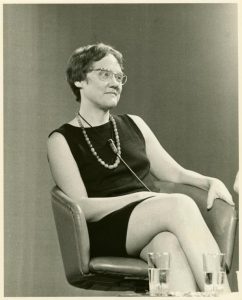
Barbara Gittings, courtesy of the New York Public Library
June marks the start of Pride. A month dedicated to celebrating the LGBTQIA+ community*. Pride month commemorates the Stonewall Riots as well as the struggle for civil rights and equal justice under the law for the LGBT community. In June of 1969 the NYPD raided the Stonewall Inn, a gay club in NYC’s Greenwich Village, sparking an uprising among bar patrons and neighborhood residents who decided to fight back against police harassment and brutality towards the LGBT community. The riots lasted six days and became a catalyst for the gay liberation movement. Today, Pride is celebrated around the world as a way to uplift the community’s voices, raise awareness, and continue the fight for equality. In honor of this being Pride month, we turn our gaze towards the LGBTQIA+ individuals who have had an impact on history, and this week we honor Barbara Gittings.
Barbara Gittings is widely regarded as the mother of lesbian and gay liberation. In 1948, a high school teacher told her that she was probably kept out of the National Honor Society because of “homosexual inclinations.” At Northwestern University, she was confronted with rumors that she was a lesbian. Gittings accepted the label, but questioned the prevailing view that homosexuality was looked down upon. In 1951, she discovered Donald Webster Cory’s The Homosexual in America: A Subjective Approach. She wrote to Cory’s publisher, discovered he lived in New York City, and the two met on several occasions.
In 1956 she joined the Daughters of Bilitis (DOB), the first lesbian rights group in the U.S. Her first meeting was at a member’s apartment in San Francisco. This was Gittings’s first time interacting with a group of lesbians outside of a bar setting, safe from police raids, and it fueled the activist inside of her. She soon started an East Coast chapter of the organization based in New York City. Gittings, along with her co-founder, Marion Glass, built this chapter into the largest in the country.
In 1963, the DOB asked Gittings to take over as editor of The Ladder, The DOB’s national magazine for gay women. She transformed it from what was essentially a newsletter into a national magazine that was well respected within LGBT circles. She began reporting on protests, engaging in debates and arguments, and questioning the merits of some of her fellow activists’ strategies. After three years of serving as editor, she was excused from her position.
Gittings remained active in her activism after leaving her editor position. In fact, she marched in some of the first gay picket lines in 1965. She marched outside the White House, the Pentagon, and Independence Hall with a sign that read, “Sexual Preference is Irrelevant to Federal Employment” in order to protest the federal government’s policy on discrimination of homosexuals. Today that sign along with copies of The Ladder are in the Smithsonian today to commemorate the marches and Gittings activism.
Gittings also worked with her close friend and gay rights activist, Frank Kameny, as well as other activists to lobby the American Psychiatric Association (APA) to remove homosexuality as a diagnostic category from the Diagnostic and Statistical Manual (DSM). At the APA’s 1972 conference, held in Dallas, Texas, Gittings, Kameny, and other activists created a display entitled “Gay, Proud, and Healthy: The Homosexual Community Speaks.” The exhibit portrayed gay people as healthy and happy, not as patients who were in need of a cure. In December of 1973, the APA board of trustees voted to pass a resolution to remove homosexuality from the DSM, effectively declassifying it as a mental illness.
Gittings also successfully crusaded to promote LGBT literature and eliminate discrimination in the nation’s libraries. She volunteered with the Gay Task Force of the American Library Association, the first gay caucus in a professional organization. Although she was not a librarian, she soon became the group’s coordinator—a position she held for 16 years. The American Library Association awarded her a lifetime membership. Her most memorable quote was “Equality means more than passing laws. The struggle is really won in the hearts and minds of the community, where it really counts.”
Barbara Gittings passed away on February 18th, 2007, at the age of 74 after a long battle with breast cancer, but her legacy lives on through the lives she’s changed through her dedication to advocacy and activism.
*LGBTQIA+ stands for: Lesbian, Gay, Bisexual, Transgender, Queer, Intersex, and Asexual. The plus represents the vast number of other sexual orientations and gender identities that may not be as well known. To learn more about the LGBTQIA+ community and the various identities in the world, visit PFLAG’s LGBTQ+ glossary here: https://pflag.org/glossary/
References
Barbara Gittings. Barbara Gittings | LGBT 50th Anniversary July 4, 2015. (n.d.). https://lgbt50.org/barbara-gittings
Glbt History Month (2006, October 14). Barbara Gittings. Archived from the original on September 26, 2007. https://web.archive.org/web/20070926224422/http://www.glbthistorymonth.com/glbthistorymonth/bio.cfm?LeaderID=14
Iovannone, J. J. (2019, May 30). Barbara Gittings: Mother of the gay rights movement. Medium. https://medium.com/queer-history-for-the-people/barbara-gittings-mother-of-the-gay-rights-movement-b321cb527f20
Salvo, V. (n.d.). Barbara Gittings. Legacy Project Chicago. https://legacyprojectchicago.org/person/barbara-gittings